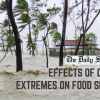People need urgent relief from inflation

The continued inflationary pressure on ordinary citizens, as evident in the ever-lengthening queues in front of the TCB truck sales points and Open Market Sale (OMS) shops, is alarming. As reported by this daily, men, women, and even children are waiting for hours at various locations in Dhaka, anticipating the arrival of TCB trucks. In the busy Mirpur-10 area, for instance, around 300 people gathered early Monday morning, hoping to buy subsidised essentials that serve as a lifeline for low-income families. Elderly women, some as old as 70, were seen standing in line for hours and then running after a TCB truck to purchase necessities. Pregnant women also endured hours in line under the scorching sun to access low-cost essentials. With inflation remaining above 9 percent for 20 consecutive months, even middle-class individuals have joined these long queues.
Reportedly, a large number of people from low-income households are scrambling for essentials at the TCB truck sales points and OMS shops, which has become a defining picture of the city of late. Despite the government's efforts to increase the supply of low-cost essentials, it remains insufficient to meet the overwhelming demand. For example, according to one TCB goods seller, while they can serve about 350 people a day, around 700 people gather daily at their spot, indicating that TCB trucks are able to meet the needs of only half those seeking daily essentials.
Elderly women, some as old as 70, were seen standing in line for hours and then running after a TCB truck to purchase necessities. Pregnant women also endured hours in line under the scorching sun to access low-cost essentials. With inflation remaining above 9 percent for 20 consecutive months, even middle-class individuals have joined these long queues.
According to a recent report by the Integrated Food Security Phase Classification, released by international agencies including the UN, nearly 23.3 million people—or 26 percent of Bangladesh's population—are experiencing high levels of acute food insecurity. This situation is not only driving increasing desperation among the populace, resulting in thousands of hours wasted standing in TCB lines, but also causing immeasurable suffering. Additionally, the long-term health impacts of people cutting back on healthy diets will hinder progress for years if not urgently addressed.
Under these circumstances, the government must further prioritise efforts to address runaway inflation. If necessary, a high-level committee should be formed specifically to tackle inflationary pressures on low-income families. Furthermore, the government must further increase the quantity of essentials available at low cost through TCB and OMS sales. It should also work to improve the efficiency of their distribution, preventing people from enduring long lines and unnecessary hardships to access these resources.


 For all latest news, follow The Daily Star's Google News channel.
For all latest news, follow The Daily Star's Google News channel. 









Comments